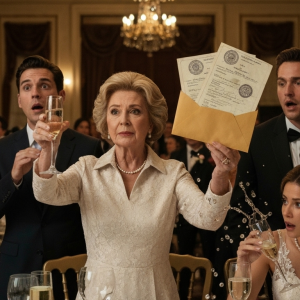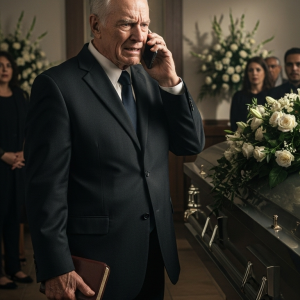“Just got discharged from the hospital. The doctor said I can’t walk much yet. Can you pick me up when you have time?”
I sent the text to my son, Michael, as a nurse wheeled me toward the hospital’s sterile, automatic doors. His reply came back faster than I had hoped, a cold little ping of dismissal.
“My wife says we can’t keep dropping everything for you. Just call an Uber.”
As they would soon discover, who picked me up instead would shatter their lives.
My name is Dorothy Parker—Dot to most—and at sixty-five, I thought I’d seen every possible flavor of family disappointment. I was wrong. Three days earlier, I’d been rushed to Phoenix General with what felt like a blowtorch being taken to my gallbladder. Emergency surgery, they said.
The whole time I was in that hospital bed, I kept expecting Michael to visit. Or Sarah, my daughter-in-law, who had been so concerned when I first called about the pain. “Oh, Dot, you need to get to the ER right away,” she’d said, her voice dripping with what I mistook for genuine worry. “Michael and I will meet you there.” They never showed.
I made excuses for them, just as I’d been doing for two years, ever since they’d moved into that oversized house they couldn’t quite afford. But sitting in that wheelchair, staring at my son’s text, something inside me didn’t break—it clarified. It was like putting on reading glasses for the first time and finally seeing the fine print.
I called a cab. Twenty minutes later, a well-dressed man in his early sixties approached my wheelchair. He wasn’t the driver. “Mrs. Dorothy Parker?” His voice was warm but professional. “My name is Robert Hamilton. I’m from Regional Southwest Financial, and we need to talk.”
I should have been alarmed. Instead, a strange calm washed over me. “If this is about Michael’s mortgage, Mr. Hamilton, I’m afraid I’m not in a position to help.”
His expression shifted to surprise. “Actually, Mrs. Parker, I think you’ll find it’s quite the opposite.”
Robert helped me into his car, a modest Toyota that screamed bank employee, not flashy wealth. “I’m a regional manager at the bank that holds your son’s mortgage,” he said, starting the engine. “And for several months, Michael has been telling us some very… creative stories about his family situation.”
My blood chilled. “What kind of stories?”
“Stories about supporting his elderly mother through extensive medical costs. Claims that you’ve been a significant financial burden due to… progressive health issues.” Robert glanced at me at a red light. “According to Michael, you’ve been unable to care for yourself and have been draining his resources.”
I stared at him, stunned. “That’s completely untrue.”
“I know,” his voice was gentle but firm. “I’ve been investigating his application for a loan modification. Your son provided documentation claiming that monthly payments to you for medical care are why he’s fallen behind.”
“Payments to me?” My voice was a squeak.
“Except the bank statements he provided show consistent payments from you to him for over two years.” Robert pulled into a small park and cut the engine. “Mrs. Parker, your son has been using your generosity as evidence of his hardship, all while defaulting on a loan you don’t even know you’re responsible for.”
The world tilted. “Responsible for?”
“You co-signed his mortgage application two years ago. He told you it was just a character reference, didn’t he?” Robert’s expression was sympathetic. “But you signed as a co-borrower. If he defaults, you are equally liable for the entire debt.”
I closed my eyes, the memory of that day at the bank rushing back. Michael, so excited, rushing me through the paperwork. I had been so proud. “How much?” I whispered.
“Current balance is $344,000, with late fees and penalties.”
I looked at him, a question forming. “Mr. Hamilton, why are you telling me this in person? Isn’t this something for official channels?”
Something flickered across his face. “Because fraud cases involving elder financial abuse deserve personal attention. And because…” he paused, struggling, “…something about your name seemed familiar. I had to meet you myself.”
“Familiar how?”
He was quiet for a long moment. “Mrs. Parker, what was your maiden name?”
“Sullivan,” I answered automatically. “Dorothy Sullivan. Why?”
The change in his face was profound. Color drained from his cheeks, and his hands gripped the steering wheel so tightly his knuckles went white.
A name from a lifetime ago surfaced in my memory. “Bobby?” I whispered, the impossible recognition hitting me like lightning.
“Hello, Dot,” Robert’s voice was barely audible. “I’ve been looking for you for forty-five years.”
The summer of 1980 crashed over me. Bobby Hamilton, the boy I was supposed to meet at Union Station. The man I was supposed to marry.
“You changed your name,” I managed.
“Hamilton was my stepfather’s name. I started using it after…” he swallowed hard, “…after you didn’t show up that morning.”
“I did show up!” Tears streamed down my face. “I waited for three days, Bobby. My parents told me you’d taken a job in San Francisco and didn’t want a small-town girl holding you back.”
He turned to face me, his own eyes bright. “Your father came to see me six months later. He told me you’d married someone else, that you were pregnant with another man’s child. He said you wanted me to leave you alone.”
“They lied,” the words came out broken. “They lied to both of us.”
We sat in that car, trying to process four decades of lost time. Finally, Robert’s voice grew stronger, pulling us back to the present. “Dot, regardless of our history, what your son has done is serious fraud. He has set you up to take the entire fall.”
“What exactly has he done?”
“He’s three months behind on payments. He applied for a loan modification, claiming financial hardship due to caring for his ‘incompetent mother.’ He provided falsified medical records stating you have dementia and require full-time care.”
The scope of the betrayal was breathtaking.
“So when you paid his mortgage,” Robert explained, his voice grim, “it became ‘expensive home modifications for your disability.’ When you bought them groceries, it was ‘specialized dietary requirements.’ He has twisted your love into evidence of your incompetence.”
“What happens now?”
Robert’s smile was cold. “Now, we give him exactly what he’s been asking for. A visit from his incompetent mother.
The next morning, I stood in Robert’s office, watching Michael through a conference room window. He looked cocky, spreading documents across a table for a loan officer.
“Twenty-six minutes of complete fiction so far,” Robert murmured beside me. “He’s currently explaining how your progressive dementia requires round-the-clock supervision.”
“Some dementia,” I scoffed. “I did yoga this morning.” I straightened my dress. “I’m ready.”
Robert opened the conference room door. “Michael, I’d like you to meet someone.”
The look on my son’s face was worth a lifetime of pain. His jaw went slack, the color draining from his face. The papers in his hands fluttered to the floor. “Mom? What are you—how did you—”
“Hello, sweetheart,” I said, settling into the chair across from him. “Don’t let me interrupt. I was just hearing about my progressive dementia. Please, continue.”
Michael’s face cycled through panic and desperate calculation. “I can explain—”
“Oh, good,” Robert said, closing the door. “Because I’m very interested in explanations. Particularly about these medical bills.” He placed a folder on the table, revealing copies of my checks. “Would you like to explain to your mother how her mortgage payments became her medical expenses?”
Michael recovered quickly, shifting into his concerned son routine. “Mom, you don’t understand. I was trying to protect you from the stress—”
“Hardship caused by caring for me?” I asked sweetly.
Robert’s voice cut through his stammering. “You submitted an application claiming your mother requires full-time care. You provided records stating she’s been hospitalized six times this year.” He paused. “Mrs. Parker, would you like to tell your son what you did yesterday afternoon?”
I smiled. “Well, after our chat, I walked three miles through downtown Phoenix with Mr. Hamilton. Then I cooked dinner and discussed banking regulations. After that, I drove myself home.” Michael’s mouth opened and closed silently. “Tell me, son. Which part of that sounds like someone who needs full-time care for dementia?”
“This is all a misunderstanding,” he stammered, his voice losing conviction. “Sarah and I have been so worried about you.”
“Really?” I leaned back. “Because when I texted you for a ride home from surgery, your immediate response was to tell me to call an Uber. That doesn’t sound like worry.”
Robert opened another folder. “Michael, I have your original loan application. You only qualified for this loan because your mother co-signed.”
My head snapped toward Michael. “You told me I was a character reference. Are you telling me I’ve been legally responsible for this debt all along?”
Robert nodded gravely. “When Michael defaults, the bank can pursue you for the full amount. Garnish your retirement, your home.”
I stared at my son, a stranger who had gambled away my entire future.
Robert cleared his throat. “There’s more. The falsified records constitute bank fraud. Given this involves a federally insured institution, we’re looking at federal charges.” Michael went white. “Bank fraud, falsification of documents, elder financial abuse,” Robert counted off. “The penalties are quite severe.”
A strange calm settled over me. My hands, which had been trembling, were now perfectly still. I met my son’s terrified gaze, and for the first time in years, I held all the cards.
“Mr. Hamilton,” I said slowly. “What are my options here?”
Robert glanced from me to my son. “Well, that depends on how cooperative everyone wants to be.”
I smiled at Michael. “It means, sweetheart, that your life is about to change dramatically. And this time, I’m the one making the decisions.”
The phone started ringing at 6:00 AM the next morning. It was Sarah.
“Dot, thank God,” she said, her voice a practiced performance of panic. “There’s been a terrible misunderstanding. That man, Mr. Hamilton, he’s confused—”
“Sarah, dear,” I cut her off, pouring my coffee. “I was there. I heard every word. There is no confusion.”
“But you don’t understand the pressure we’ve been under!” she cried. “Think about Emma and Jake! Do you really want their father to face criminal charges?”
There it was. The emotional blackmail I’d been blind to for years. “Funny thing about family, Sarah. I thought it meant honesty, not using your mother as collateral for criminal activity. Tell Michael I’ll be at the house at 2:00 PM. We need to discuss my options.”
At exactly 2:00 PM, I rang the doorbell of the house I’d unknowingly bought. Michael sat hunched over his laptop, researching defense attorneys. “I know I messed up,” he began.
“The mess you created,” I clarified, settling into an armchair. “Robert Hamilton is trying to collect on a debt that you defaulted on while committing fraud.” I opened a folder. “Since I am legally a co-borrower, that gives me certain rights. Including the right to take possession of the collateral property to protect my interests.”
Michael’s face went ashen. “What does that mean?”
“It means, sweetheart, that since I’ve been subsidizing your mortgage anyway, I can assume the payments and take ownership of the house to prevent foreclosure. The only difference would be that you’d need to find somewhere else to live.”
“You can’t throw us out of our home!” he shouted.
“Your home?” I raised an eyebrow. “The home you lied to federal authorities about my mental competence to keep?”
Sarah started crying. I was unmoved. “However,” I continued, “Mr. Hamilton said the bank would consider dropping criminal charges… under certain conditions.”
“What conditions?” Michael asked desperately.
I pulled out another document. “Full financial restitution. Penalties, legal fees, fraud damages. The total comes to $67,000.”
“We don’t have that kind of money!” Sarah sobbed.
“No,” I said, letting the word hang in the air. “But I do.” Hope flickered in their eyes. “I could pay it. Save you from federal prison. For a price.”
I slid the final document across the table. “A formal rental agreement. I pay off your debt and assume full ownership of this house. You can continue living here as my tenants. Market rate rent. One-year lease.”
Sarah stared at the paper. “These rent payments… they’re higher than our mortgage was.”
“Yes. Market rate for a house this size. Of course, you’re welcome to find somewhere else,” I said pleasantly. “The alternative is Mr. Hamilton proceeds with charges, and I exercise my co-signer rights anyway. Same outcome, but with a felony record for Michael.”
The grandfather clock in the corner, another gift from me, ticked away the seconds.
“There’s something else,” I said, opening my purse. “When banks discover fraud, they review all related accounts.” I pulled out a report. “It turns out your business line of credit application from 18 months ago was also… creative. The one where you claimed I was a business partner contributing startup capital, using my mortgage assistance checks as proof.”
Sarah gasped, grabbing Michael’s arm.
“Two separate incidents,” I stated. “That establishes a pattern. Makes plea bargaining much more difficult. Unless, of course, the victim testifies that she was a willing participant who simply misunderstood.”
Michael’s hands were shaking. “What do you want, Mom?”
“I want respect,” I said calmly. “I want honesty. And if we sign this agreement, the investigation closes and the charges disappear. You made your choice when you decided I was too much of a burden to pick up from the hospital. Now I’m making mine.”
Three days later, I met Robert for coffee.
“They signed it this morning,” he said, his smile satisfied. “You are now officially their landlord. Congratulations on your new investment property.”
“Robert,” I said, “how did you really know it was me? Dorothy Parker is a common name.”
He set his cup down. “Your credit report. It listed your previous address. Maple Street in Milfield, Ohio. I lived on Oak Street, three blocks away. I memorized that address forty-five years ago, Dot.”
If Michael hadn’t committed fraud, our paths never would have crossed. “In a twisted way, I should thank my son for lying to federal banking authorities.”
“I prefer to think of it as destiny finding a way,” Robert said, his eyes warm with the same tenderness I remembered from our youth.
My phone buzzed. A text from Michael. Mom, can we talk? I want to make this right. Not just the agreement, everything. I want to be the son you deserve.
I showed it to Robert. “What do you think?”
“I think he’s had three days to realize federal prison isn’t an attractive option,” he said thoughtfully. “But people can change, Dot. Sometimes a crisis forces growth.”
I typed back. Come to my apartment tomorrow at 7 PM. Come alone.
The next evening, he arrived holding an envelope. His eyes were genuinely remorseful. “I owe you an apology that’s bigger than words can express,” he began. “The truth is, I was protecting myself from failure. And I used your love as a shield.”
He handed me the envelope. Inside was a cashier’s check for $67,000. “I sold my business at a loss, but it was enough. Sarah and I are in counseling. I’m hoping… I’m hoping we can rebuild trust.”
I looked at my son and saw, for the first time in years, accountability. “The rental agreement stands,” I said firmly. “You will earn back the right to call this house yours. But I am willing to discuss a path back to family. A real family.”
Six months later, I was preparing Thanksgiving dinner in my kitchen. Michael and Sarah were respectful tenants and, more importantly, honest family members. Robert was in the living room, teaching my granddaughter Emma to play chess.
As my family gathered around my table, in my house, by my rules, with my chosen partner at my side, I thought about the girl who’d waited at that train station. She couldn’t have imagined this life, but I think she would have been proud.
Later that evening, as Robert and I cleaned up, he reached into his pocket and pulled out a small velvet box. “I know we’re not kids anymore, Dot. But some things are worth waiting for.” He opened it, revealing a simple, elegant ring. “Dorothy Sullivan Parker. Will you marry me?”
I stared at him through tears of joy. “Are you sure? I come with complicated family and a granddaughter who cheats at chess.”
“I come with no family at all and a modest savings account,” he smiled. “I think we balance each other out perfectly.”
“Then yes,” I whispered. “Yes, I’ll marry you.”
As he slipped the ring on my finger, I realized that Michael’s destructive choices had been the very thread that wove our lives back together.
“I’m taking early retirement,” Robert said, pulling me close. “I’d like to travel with you. See the places we talked about when we were twenty. We’ve waited forty-five years for our second chance, Dot. I don’t want to waste another day.”
I looked around the kitchen, feeling a profound sense of peace. For years I’d been taken for granted, useful only for the support I could provide. Now, I was a woman who commanded respect and was loved for exactly who I was.
“When do we leave?” I asked.
Robert’s laugh was pure joy. “How about tomorrow? I know a little place in San Francisco where two old lovers can start their new life together.”
Sometimes, the best revenge isn’t revenge at all. It’s refusing to be invisible, demanding the respect you deserve, and being brave enough to embrace the love you thought you’d lost forever. The girl at the train station finally got her happy ending. It was just forty-five years later than planned.




